CFA is ‘infuriated ’ with CSU
 By Nikita Bankar STAFF WRITER
By Nikita Bankar STAFF WRITER
The California Faculty Association held a meeting in the Charles W. Davidson College of Engineering building to discuss the next steps for union bargaining with the California State University on Tuesday.
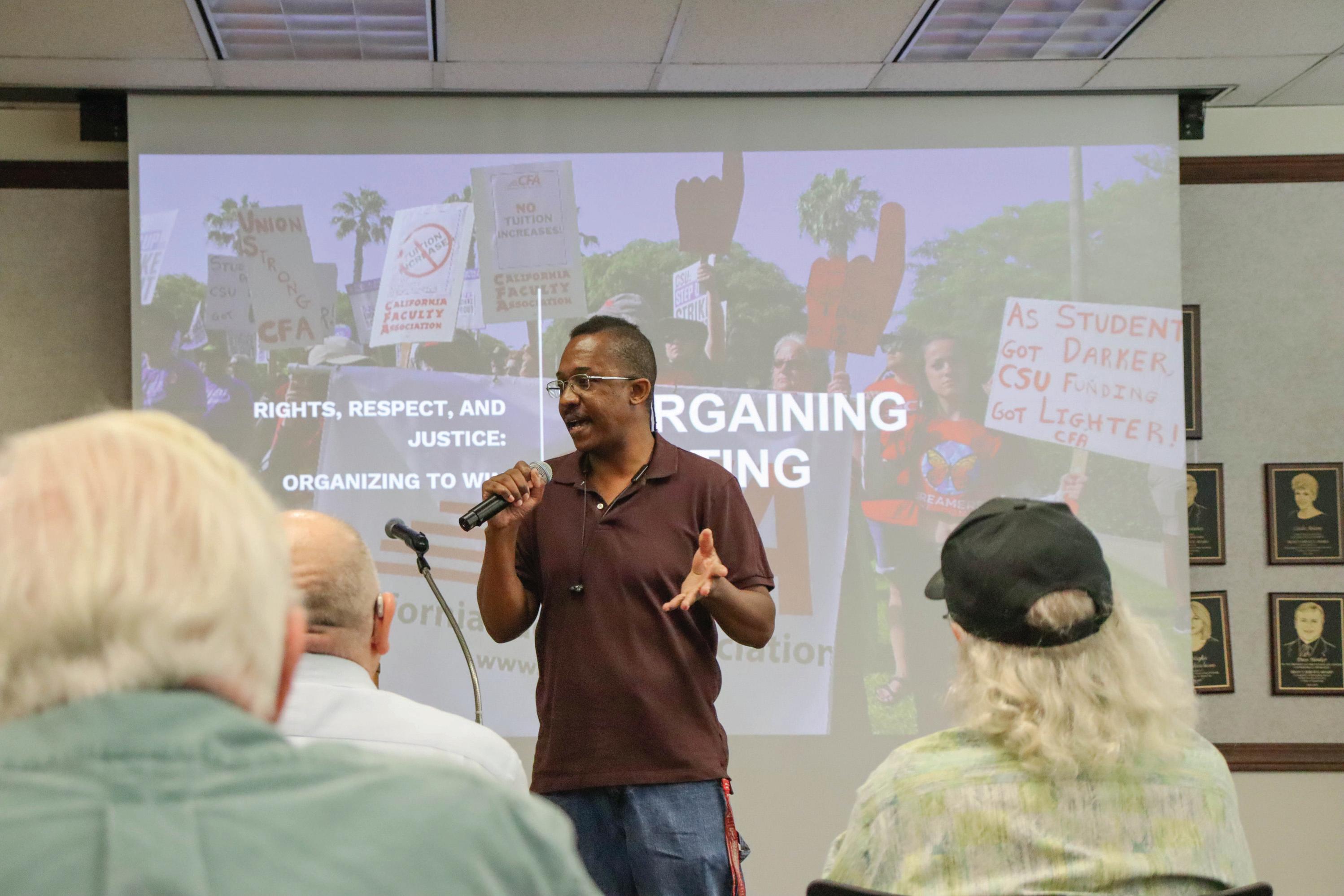
According to its website bio, the California Faculty Association (CFA) is a union of 29,000 professors, lecturers, librarians, counselors and coaches working to transform higher education into a more inclusive environment.
The CFA is currently bargaining for a 12% salary increase, according to the CFA Sunshine Letter to Commerce Re-opener Bargaining.
According to its website, the CFA is bargaining for many things in addition to the 12% raise, including an increase to the minimum salary for the lowest paid faculty, a full semester of paid parental leave, course caps and reasonable counselor workload and safe and accessible lactation spaces.
The CFA is also bargaining for safe and accessible genderinclusive restrooms and changing rooms, and safety provisions for faculty interacting with police officers on campuses, according to its site.
Ray Buyco, San José chapter president of the CFA and senior history lecturer, said he is tired of the CSU and their notion of sacrifice.
“We knew about sacrifice when inflation hit us and we didn’t get compensation to take care of us on that level,” Buyco said.
After a Sept. 11 meeting with CSU management and a state-appointed third party for mediation, members of the CFA Bargaining Team left without a settlement, according to the CFA website. Subsequently, the mediator released the parties to fact finding.
According to an Instagram post from the CFA, mediation is when a mediator is assigned to help parties resolve disagreements. After four weeks in mediation, a resolution was not met between the CFA and CSU.
Fact finding is the current step in the bargaining process the CFA is on, where a panel consisting of a neutral thirdparty and one representative from each side, will hold hearings to make recommendations for a settlement, according to a CFA Instagram post.
“This may be the last time we have an opportunity to take a stand and say ‘you know what, we’re not sacrificing this time,” Pinnell said. “If a strike happens, understand we are doing it for the right reason, and that means all the work stops.”
Benoit Delaveau, senior lecturer of environmental studies, said he is upset that his hard work is not being recognized as a professor.
“I have been a lecturer for 12 years,” Delaveau said. “I did everything right, and I got the minimum?”
is our ability to continue to do what we do.”
According to CFA Proposal No. 1, the CSU recognizes the importance of procedures for the protection of health and safety of faculty unit employees. The CSU will attempt to maintain conditions that are crucial to the health and safety of the employees.
Sociology lecturer Christopher Cox said it is infuriating when the CSU pretends they don’t have the money or resources to fulfill CFA requests.
“When you have special pet projects on the side as a CSU system, you cannot prioritize these over the actual day to day needs that you have for running your system,” Cox said.
Between 2022 and 2023, the CSU has accumulated an $8.5 billion reserve. The reserve was a result of the CSU Consolidated Investment Pool and cash in the state treasury, according to CSU Opengov.
Reserves are essentially money that is available to be used for a wide range of possibilities, including meeting future planned payments, unexpected events, emergencies, and opportunities, according to Market Business News.
On Aug. 26, Jolene Koester, who has been the CSU interim chancellor for the past 16 months, posted a video addressing faculty and staff requests from the CFA.
Sabrina Pinnell, CFA chapter secretary and senior political science lecturer, referred to Koester’s video in response to CFA demands, and said the undertone of her video was insulting.
“There is an undertone to speeches like that that we’ve seen before,” Pinnell said. “There is an undertone of you’ve got to step up, and that this is a joint problem. Then, there is the veiled threat that you are asking for too much.”
Pinnell also said now is the time to take action.
Steven Filling, accounting professor at Stanislaus State, said the CSU’s response to the CFA salary proposal was insulting.
“They responded to our proposal saying ‘we’ll think about it’ or ‘we don’t know what you mean,’ ” Filling said. “So, when Interim Chancellor Jolene, who is the best satirist I’ve ever met, comes back and says this is about money, well pardon my language, bullshit.”
Filling also said the main purpose behind the CFA and its current demands are for the working conditions of his colleagues.
“This is about the professional and personal safety of our colleagues,” Filling said. “This
Cox also said looking towards the future, the CFA wants to make sure people on this campus know that they are a part of this fight and they are not backing down.
“We’re going to continue to push forward, build our power and we’re going to fight the hell out of this fight, because we need to win,” Cox said.
SERVING SAN JOSÉ STATE UNIVERSITY SINCE 1934 WWW.SJSUNEWS.COM/SPARTAN_DAILY Volume 161 No. 16 Wednesday, September 27, 2023 NAMED BEST CAMPUS NEWSPAPER IN CALIFORNIA FOR 2022 BY THE CALIFORNIA COLLEGE MEDIA ASSOCIATION AND CALIFORNIA NEWS PUBLISHERS A SSOCIATION
NIKITA BANKAR | SPARTAN DAILY
Christopher Cox, sociology lecturer, speaks at a California Faculty Association meeting regarding the bargaining process with the California State University system on Tuesday.
Follow the Spartan Daily on X (formerly Twitter) @SpartanDaily
There is an undertone of you’ve got to step up, and that this is a joint problem. Then, there is the veiled threat that you are asking for too much.
Sabrina Pinnell CFA chapter secretary and senior political science lecturer
City Council talks waste management
By Melany Gutierrez STAFF WRITER
Mayor Matt Mahan, City Councilmembers and San José residents addressed the issue of hazardous bike lanes obstructed by waste products, illegal dumping and dumpsters at the weekly Tuesday City Council meeting.
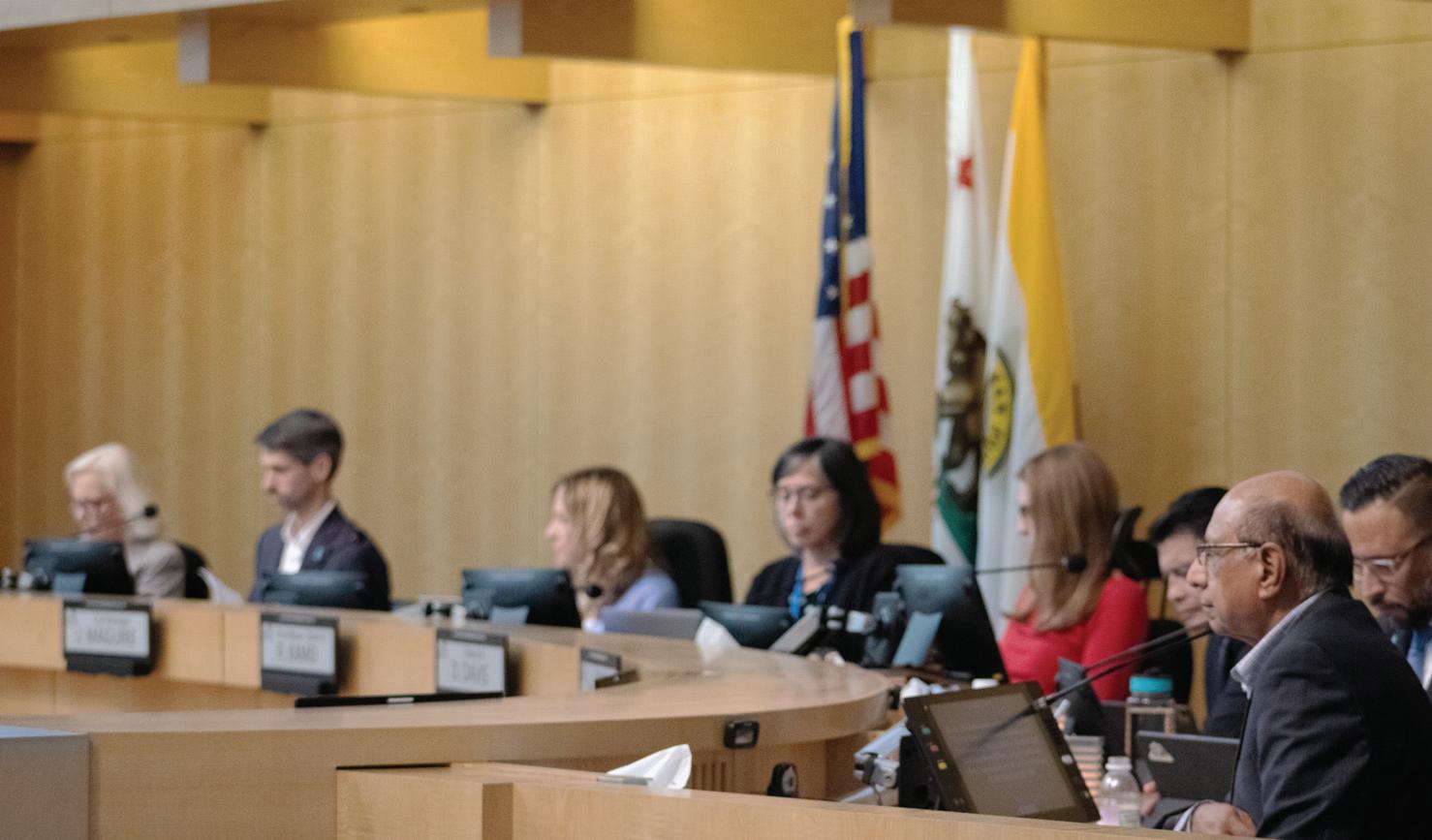
The councilmembers discussed an audit report on the Integrated Waste Management Enforcement program, run by the San José Environmental Services department.
The Integrated Waste Management Enforcement Team (IWM) oversees collection, processing and disposal of solid waste and enforces solid waste regulations, according to a webpage document from the City Auditor’s Office.
San José city auditor Joe Rois said he conducted the audit after it was requested by the administration.
“The objective of this audit was to evaluate the Integrated Waste Management Enforcement Team’s service delivery,” Rois said.
Rois said the Integrated Waste Management Enforcement Team also has the responsibility of administering education, and outreach about regulations and municipal codes with the San José community.
“The team conducts inspections of businesses and residents primarily based on what complaints they receive from the public,” Rois said.
The team has five different positions, four inspectors and one supervisor, who responds to complaints, talks to residents and businesses about solutions, according to a webpage from the city auditor.
The cases reported usually involve dangerous accumulation, improper set out of containers, illegal hauling and other issues, according to the same webpage.
Rois said there has been a decline in the number
of complaints filed with the Integrated Waste Management Enforcement Team.
In 2018 and 2019, cases were at about 1,500 per year and have had a big drop from 2020 to now, according to a webpage from the city.
“In 2022 the team handled about 840 cases overall. The largest single category of cases was related to dangerous accumulation,” Rois said.
In the first half of 2023, each Integrated Waste Management Enforcement Team inspector was conducting about 2.3 inspections per day, which is below expectations, according to a webpage from the city auditor.
Rois and the councilmembers also discussed their expectations and future goals to increase productivity for the Integrated Waste Management Enforcement Team.
New responsibilities, such as outreach or enforcement related to new legislation or existing ordinances, have been added to the team’s tasks already, according to the webpage document from the city auditor’s office.
Updating procedures would enable the team to better reach communities that may have underreported solid waste violations and tailor outreach materials appropriately.
Kerrie Romanow, the Director of the Environmental Services Department for the city of San José, said her department intends to improve almost all the unresolved points mentioned and use recommendations to improve proactiveness and effectiveness of the team.
San José resident Jordan Moldow said he supports most of the recommendations made, but has concerns since both the report and the recommendation mention nothing about trash collisions.
Moldow said he is worried if the report is accepted as is, the Integrated Waste Management Enforcement Team might downplay
problems pertaining to illegal or hazardous bike lane issues.
“A man was killed in May while using a San José bike lane when his scooter struck an improperly placed brush pile and he was ejected,” Moldow said. “This was a preventable tragedy, but sadly this represents the status quo. We need an immediate change before more lives are lost.”
Moldow said he see’s bike lanes obstructed by bins and dumpsters daily, which he said can be a hazard at night when they’re less visible.
He said most dumpsters are always placed on top of bike lanes which is a violation of city law.
“If cyclists leave the bike lane, they are at risk of car collisions,” Moldow said. “Many seem ignorant or indifferent to bike lane safety.”
Paul Soto, San José resident and frequent speaker at City Council meetings, said he has relied on biking for almost 40 years and has never owned a car.
Soto said he's faced the same issue of a bike lane obstructed by trash cans very often and it’s something that puts him at risk when he's on streets with people driving at a high speed.
“If I'm going at a high rate of speed, and I make a swerve to move out of the way I end up moving into a traffic lane,” Soto said. “If the timing is just right and a car is coming full speed behind me when I make that room to move out the way from the trash cans, boom.”
Soto said out of fear for his own safety and for others he wants to see more resolutions for this issue on future agendas.
He also said he wants Vision Zero of San José to pay close attention and he wants to see policies addressing these issues instead of rhetoric and useful outcomes from their funding.
Visions Zero is a division in the City of San José administration dedicated to improving roadways and putting in safety measures.
Martin Delson, San José resident, said the city should consider getting expert help or advice on this issue by consulting organizations like the Silicon Valley Bike Coalition.
The Silicon Valley Bike Coalition is an organization and a community of bikers who aim to make bicycling safe and accessible to everyone and encourage biking for all purposes, according to their website.
“The city has put a lot of effort into building bike lanes, but very little effort into keeping them actually usable,” Delson said.
Romanow said because residents are technically allowed to put their trash bins directly outside their home even if it’s on the bike lane, city inspectors would not enforce any policy if they see it because it is not considered a violation.
“We advise residents to put their containers and yard waste out into the area in front of their home, if that includes a bike lane that is an acceptable use of the public roadway,” Romanow said. “Not to say I think that's our best answer. It's just to say that it is allowable and it has been something that we've been doing for decades.”
Romanow said there is still certainly room for improvement and plans to strategize on how to make the best use of public
infrastructure to ensure everyone’s safety and also keep trash cans accessible to city workers.
Mahan said he thinks this issue deserves a lot of additional thought and attention, as he often gets called out to address the issue through social media.
“I frequently get tagged on Twitter with photos of garbage cans or garbage trucks in bike lanes,” Mahan said.
Councilmember Omar Torres also agrees it’s a concern in the downtown area.
Torres said the issue needs to be explored, he says he often encourages people from his office to report whatever hazardous obstructions they see on Instagram.
“There's actually an entire Instagram page dedicated to the blocking of lanes in Downtown San José,” Torres said. “Because of the analytics it always pops up on my feed so I see it almost everyday.”















Councilmember Dev Davis said she regularly sees yard waste and dumpsters in bike lanes.
Davis said that Romanow’s response explaining that nothing can be enforced to change is not the right answer.
Romanow said garbage collectors have a specific time to work and urging protocols for more enforcement is not the best solution compared to finding a different place for dumpsters to go.
“As we look to re-design the


residential and commercial garbage systems, certainly, that gives us an opportunity to create a system where they’re [dumpsters] not in the bike lane,” Romanow said.
“But in between those 8-10 years, I don't know that we can enforce anything until we have a different solution.”
Davis said waiting eight to 10 years for resolution is too long and urged Romanow to review with her team and come up with options.
Mahan said policies the department makes will have to balance different interests and consider different needs and the differences in regions of San José.
He said laying out rules and enforcing them is the kind of complexity that will require thought and will come back to a committee for further discussion.
“We’ve got to reduce the amount of obstructions in bike lanes, particularly along roads where people are driving 40 to 50 miles an hour,” Mahan said. “If we want people to use bikes to get around. We just have to do better as a city.”
After discussion the motion was passed unanimously by all councilmembers to continue searching for efficient options to keep bike lanes safe.
Follow the Spartan Daily on X (formerly Twitter) @SpartanDaily
Campus offers free menstrual products
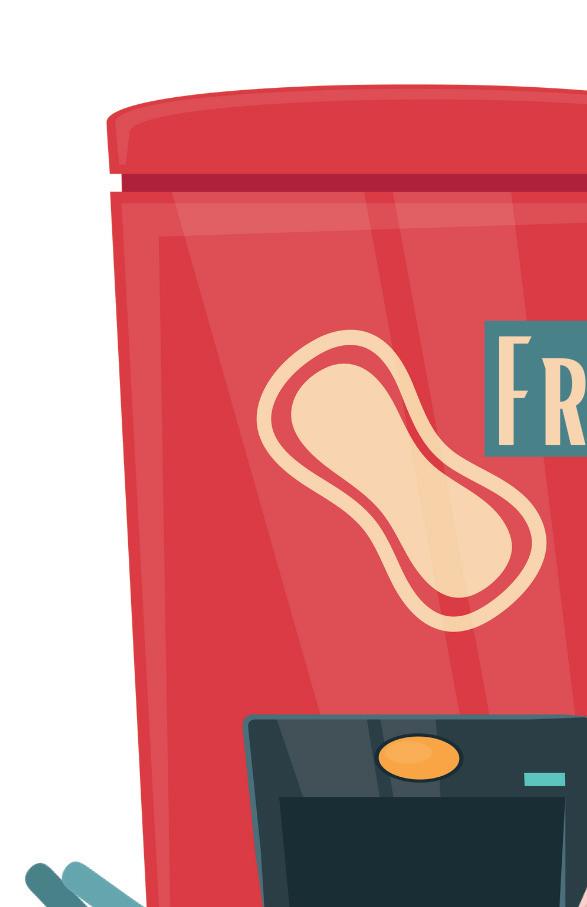 By Julia Chie STAFF WRITER
By Julia Chie STAFF WRITER
The Menstrual Equity for All Act of 2021, or Assembly Bill 367, which requires public schools in California to have restrooms provide free menstrual products, passed on Oct. 8, 2021.
The California State University system, along with other public school systems in the state will be required to have an adequate supply of menstrual products which will be enacted during the 2022-2023 school year, according to the bill.
Caroline Chen, accounting and finance associate professor at San José State with a specialty in taxes,
said the state of California does not have the tampon tax anymore.
Chen said the tampon tax is a kind of excise tax. An excise tax is in addition to the sales tax on things the government prefers you to not buy.
The state of California has not taxed period supplies and diapers since 2019, according to the Alliance for Period Supplies.
Currently, 21 states still charge sales tax on period products. They are often taxed as luxury products comparable to decor, electronics and makeup, rather than basic necessities, according to the Alliance for Period Supplies.
The pink tax is a general term for womens’ products, including pads and tampons, oftentimes costing more than products targeted to
California businesses are prohibited from charging a different price for any two goods that are substantially similar, to reduce genderbased pricing discrimination, according to the bill.
Chen said she used to teach a specific class helping low-income individuals at Santa Clara University, so she knows how difficult it is for unhoused people to get feminine hygiene products.
Multiple organizations, including SJSU Cares, the PRIDE Center, Gender Equity Center, Associated Students and the Student Wellness Center, distribute menstrual products throughout campus.
The program offers menstrual hygiene products through the Spartan Food Pantry, according to a website from SJSU Cares.
Eligible students can access the pantry once per week, and can take up to 10 pads and tampons per visit, according to the same website.
Kristen Weaver, interim senior case manager for Student Affairs at SJSU Cares, said using the Spartan Food Pantry for menstrual products is similar to
accessing any other product.
“Students can fill out our intake form on our website once per semester to determine whether they are eligible to participate at the Spartan Food Pantry, which is an assistance program for students experiencing food insecurity,” Weaver said.
Once students have completed their intake form and received confirmation that they are eligible, they can visit the Spartan Food Pantry, funding for the pantry comes from their operating budget, according to Weaver.
“We source menstrual hygiene products and other toiletry items such as toothbrushes, soap, etc. by purchasing from our operating budget,” Weaver said.
Weaver said SJSU Cares’ services are promoted on its website, Instagram and Facebook. “We also have recently placed QR code stickers that link directly to our Request for Assistance page all around campus recently, so students can quickly and easily access our services and information,” Weaver said.
Bonnie Sugiyama, director of both the PRIDE and Gender Equity Centers, said they offer menstrual
products in multiple locations on campus.
“The Gender Equity Center started having products just in the space with the Pride Center,” Sugiyama said. “At the time, we were sharing space, but we moved to the Student Union and we both have places for folks to grab them.”
Sugiyama said the center has been giving them out on campus since 2015.
Sugiyama said they were already in compliance with the Menstrual Equity for All Act, but added things like notifications in specific spots on campus so people knew about the free products.
“You’ll see two different versions (of the notification), one has yellow and blue sparkly flowers, and the other is cherry blossoms,” Sugiyama said. “You’ll probably see them all the time you go in the bathroom, now.”
Sugiyama said during the 2021-2022 school year, Associated Students started paying for the products in the Student Union in gender neutral and womens’ bathrooms.
She said some of the products the PRIDE Center and Gender Equity Center give out are
ones they have already paid for, and others they have gotten for free through promotions.
“At one point, Playtex was doing some sort of promotional thing, and they gave us a ton of tampons to give out on campus,” Sugiyama said. “I was like, ‘People are getting free period products, so that’s a win for the students.’ We’re actually still giving those away because they gave us quite a bit.”
Sugiyama said it’s not just low income students who need these products but to ensure that students were not missing class because of their period.
“You pay all this money, and we don’t want you to miss out on your educational opportunities because you’re missing a tampon or a pad,” Sugiyama said. “Who knows how far home is, so we’re making sure people are able to go to school, which is what they want to do.”
sjsunews.com/spartan_daily WEDNESDAY, SEPTEMBER 27, 2023 NEWS 2
NAVIN KRISHNAN | SPARTAN DAILY
City councilmembers discuss Integrated Waste Management Enforcement Team issues during a weekly meeting at City Hall on Tuesday afternoon.
Follow the Spartan Daily on X (formerly Twitter) @SpartanDaily
with a in taxes Period pin g ene r term f wome n produc t i nclud in an t a mp on of tent im c ost in more tha pr oduc men GRAPHIC BY ALICIA ALVAREZ
College peers and pints of beers is what customers at Peanuts Deluxe Cafe can expect to see as the cafe soft launched its newly-renovated space last week.
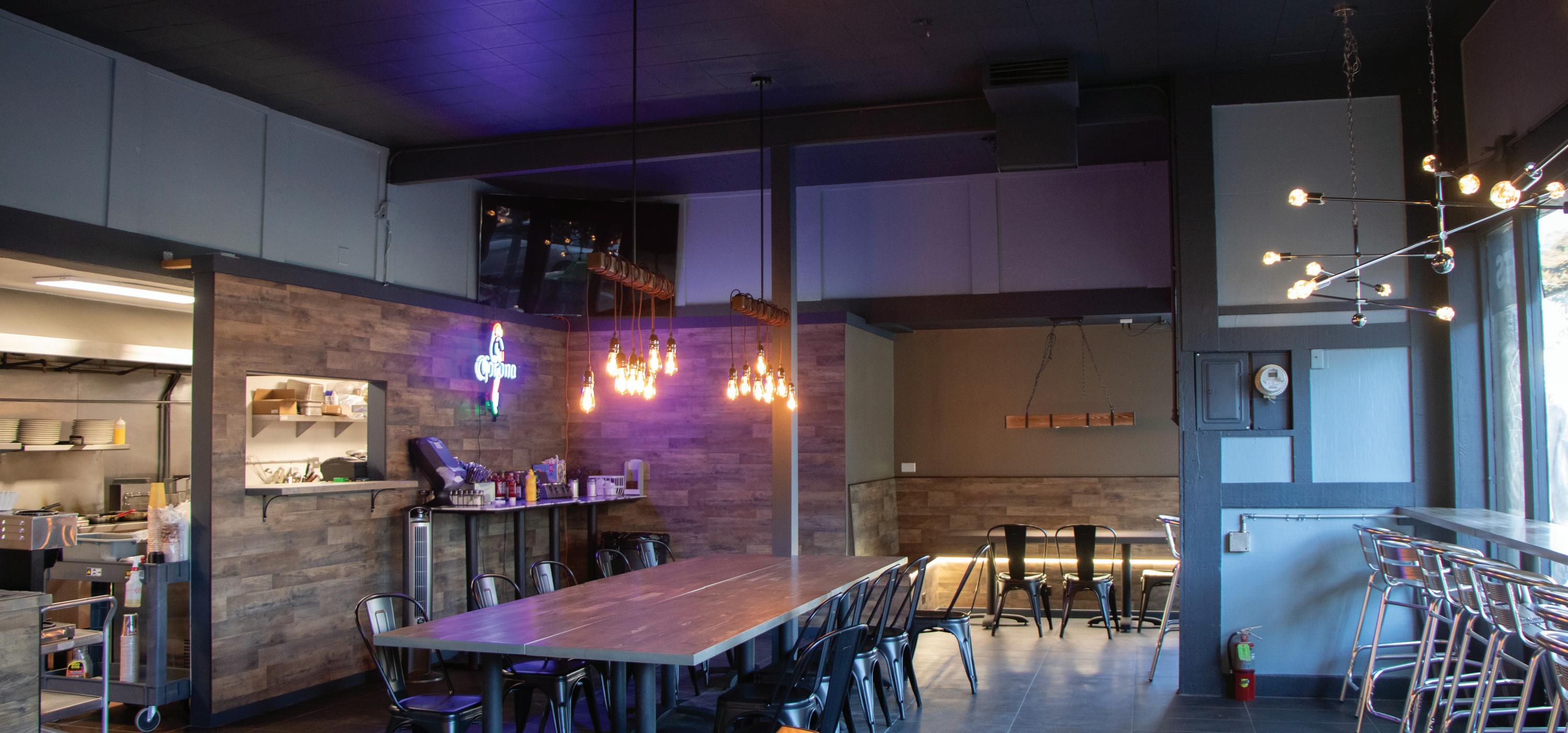
Commonly referred to as “Peanuts,” the cafe is located on East San Fernando Street, across from the College of Graduate Studies building.
The restaurant went through a number of changes to bring a new look, feel and more food.
Owner Joseph Huh said there are multiple new aspects to look forward to with the renovations after this summer.
“I feel like I got a lot more cleaner ingredients than before,
and healthier options. The food in my kitchen is pretty much all revamped so everything is clean,” Huh said. “I added some new menu items such as fried chicken, chili chicken wings and katsu rice plates while still having our popular breakfast items,” he said.
Huh said he plans to also add ambience and increase foot traffic near the cafe.
He also said he’s going to buy a new jukebox with a better sound system, and there will be sports games broadcast inside the restaurant.
Outlets for charging stations have also been implemented for every table so students or other patrons can use Peanuts as a place to do work or study.
Stephanie Nguyen, Joseph
Huh’s girlfriend and SJSU alumna, said she helps manage the cafe when she isn’t working at her human resources job.
Nguyen also said she frequented Peanuts when she was a student.
“I was here almost every other day for their breakfast, tacos and pints of beer. You really can’t go wrong here,” Nguyen said. She said after Huh came back from a month-long trip to Korea, he was inspired to add Korean fried chicken to the menu.
“He keeps telling me how he can’t wait for someone to order it [Korean fried chicken] on the menu, and for people to keep ordering it,” Nguyen said. “We had one customer where she ordered it the first time
and tried it, and then got three orders of it to go.”
Jonathan Resendiz, business senior and member of Kappa Sigma fraternity, said Peanuts has been a staple for the frat for a long time.
“When I went before it was revamped the environment felt very ‘homey.’ I went with my brothers from Kappa Sigma, and we just got fries and beer,” Resendiz said. “I do plan to continue to go to Peanuts now that it’s been remodeled. We actually already went a little over a week ago to see their renovations, and we all enjoyed the environment and new vibe,” he said.
San José resident Naomi Martin was once a frequent Peanuts customer as she lived a
block away from the cafe. Martin said while the Peanuts of the past had a “homey” feel, she would absolutely go back to see the new renovations.
“Peanuts always felt like a snapshot of SJSU history. The walls were covered with pictures and memorabilia, it felt very homey,” Martin said. “I would definitely go back now that they’re reopened to check out the new look and food,” she said.
Huh said there is currently no grand opening date, but will continue to stay in their soft re-opening stage until all the “little things [are] in order.”
Follow the Spartan Daily on X (formerly Twitter) @SpartanDaily
sjsunews.com/spartan_daily WEDNESDAY, SEPTEMBER 27, 2023 ARTS & ENTERTAINMENT 3 SJSU staple Peanuts softly reopens VANESSA REAL | SPARTAN DAILY Popular San José State eatery, Peanuts Deluxe Cafe, located at 275 E. San Fernando St. reopened its doors after a months-long c losure for renovations. By Vanessa Real STAFF WRITER ACROSS 1. Cooler for coolers 4. Builder's guidelines 9. Procedures 14. Pop artist/designer Peter 15. Bottom of the barrel 16. Foolish 17. Many a lawyer's office 20. First name in talk TV 21. Trojan War survivor 22. Regimen 23. One of the Jacksons 25. Wood for a final fire 28. Ultimately became 30. Rate indicator 32. Has permission 33. Takes a backseat 35. Able to vote, e.g. 37. Top-notch 40. Office recorder 42. Sing up high? 43. Pipe material 44. Seize 47. Indentations 51. Queens stadium name 53. Cat doctor? 55. Fellini film of 1972 56. Ducks 58. Groom, post-wedding 59. Country club? 63. Like one of the flock 64. Veep elected in 1968 65. "To Kill a Mockingbird" author 66. Formal agreements 67. Develops compassion 68. Mickey Mouse's beginnings? DOWN 1. Hinder 2. First host of 61-Down 3. Forced out 4. Tchaikovsky heroine 5. Crack or crock follower 6. Before, in verse 7. Spot for news junkies 8. "Adaptation" star 9. "An American Tail" critters 10. Ready to serve, as ale 11. Sadie Hawkins Day racer 12. SASE, e.g. 13. Notice 18. Pro 19. Player's payment 23. Pastime to throw you 24. Copycat 26. Gossip sheet 27. Hook's partner 29. French city for gastronomes 31. Noted wordsmith 34. Wily 36. Pivot 37. Clunker's savior 38. An eternity 39. Ruckuses 40. Healthful retreat 41. ABC outlets 45. Alaska's neighbor 46. Chaos 48. Walk unsteadily 49. Insignia 50. Give the go-ahead 52. Datebook entry 54. Writer's concern 57. Hidden treasures 58. Chops down 59. Bush league? 60. Juan Peron's first lady 61. D.C. spoofer 62. Harden 5 9 8 3 2 7 1 4 8 1 9 3 5 8 3 1 2 4 7 4 9 2 5 7 3 CLASSIFIEDS CROSSWORD PUZZLE SUDOKU PUZZLE Complete the grid so that every row, column and 3x3 box contains every digit from 1 to 9 inclusively. JOKIN’ AROUND What did the flight attendant say to the 2x4 when it got on the airplane? Welcome a board. PLACE YOUR AD HERE Contact our ad team via email for access to our media kit & any other advertising questions. SpartanDailyAdvertising @SJSU.edu SOLUTIONS 1 2 3 4 5 6 7 8 9 10 11 12 13 14 15 16 17 18 19 20 21 22 23 24 25 26 27 28 29 30 31 32 33 34 35 36 37 38 39 40 41 42 43 44 45 46 47 48 49 50 51 52 53 54 55 56 57 58 59 60 61 62 63 64 65 66 67 68 2 3 8 1 5 9 7 6 4 1 4 7 6 3 8 2 5 9 5 9 6 7 4 2 8 3 1 6 1 3 5 7 4 9 2 8 4 5 2 8 9 6 3 1 7 7 8 9 2 1 3 5 4 6 3 2 1 4 8 7 6 9 5 9 7 5 3 6 1 4 8 2 8 6 4 9 2 5 1 7 3 7 A P E S P A T I M H O M E D E S C R I B E S C A P I N D A S H I E L L H A M M E T T L E I A Y E A I S L E S S T U S H A L T C O M M A N D I N G L E A D S U R I R E S E A R F U L T A N V E E A N N A G E U T O P I A O L D T I P P E R I O D I C P A Y M E N T C L Y D E S E A S H A K E E L K L O T S C O L O N I A L E M P I R E S A B D U C T U N I S S U E D T O A T E E S O X T E R I SEPTEMBER 26
to students
CHEW teaches students cooking
By Joanna Chavez ILLUSTRATOR
The smell of spices filled the air at the Student Wellness Center on Tuesday afternoon as students meticulously followed jerk chicken recipes. The event was hosted by Cooking Healthy, Eating Well (CHEW). CHEW is a student run program on campus that educates students on budget friendly and nutrition-oriented meals by hosting cooking demonstrations.
Nutritional science senior Staceylline Bumanglag led the event as CHEW’s student cook.
“What we focus on is seasonal produce and targets then using cheaper produce for the season because we’re all college students,” Bumanglag said.
Students also learned kitchen skills such as sauteing, grilling and kitchen space management. Bumanglag said that learning these skills will bring students a new perspective of food.
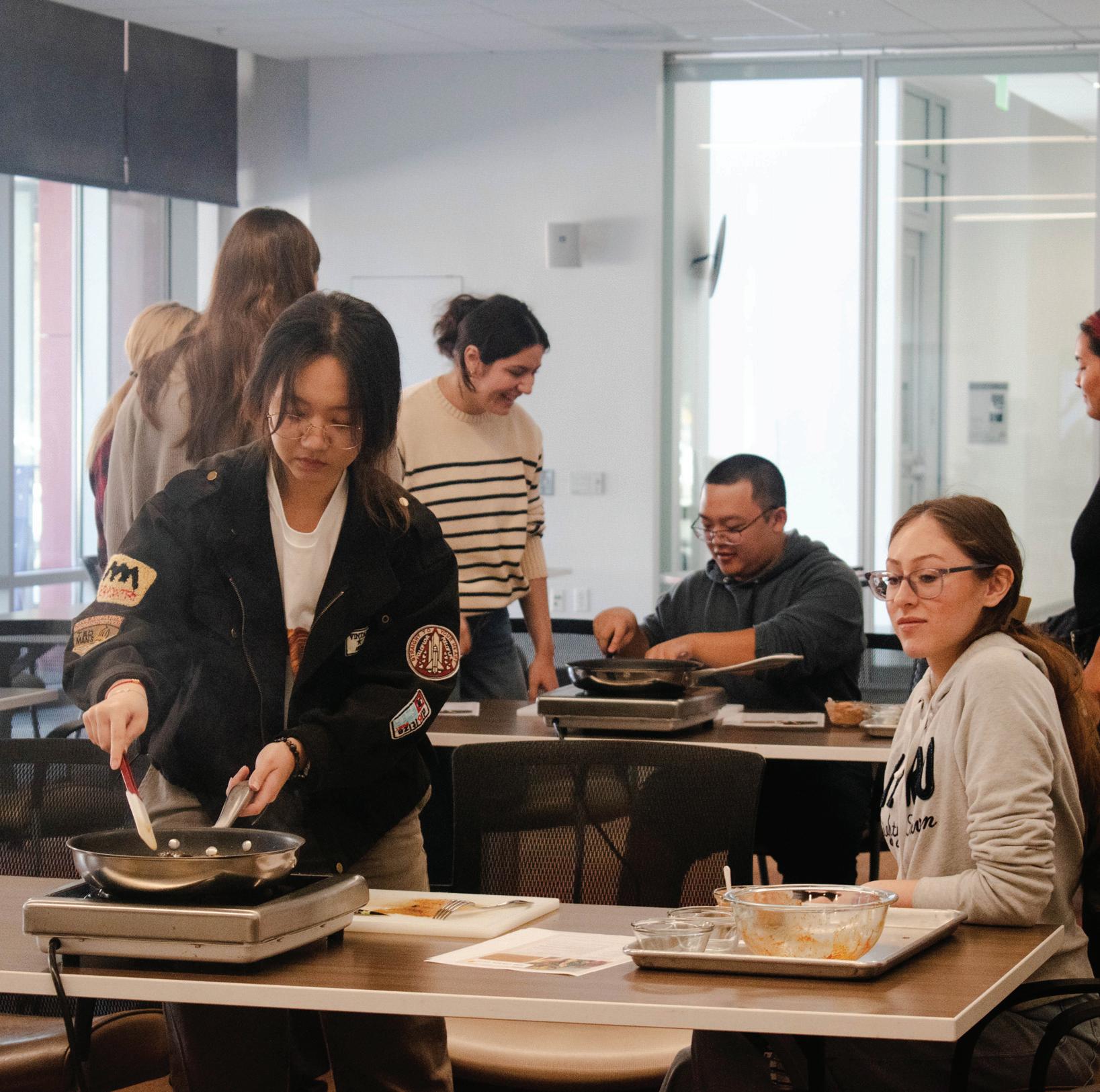
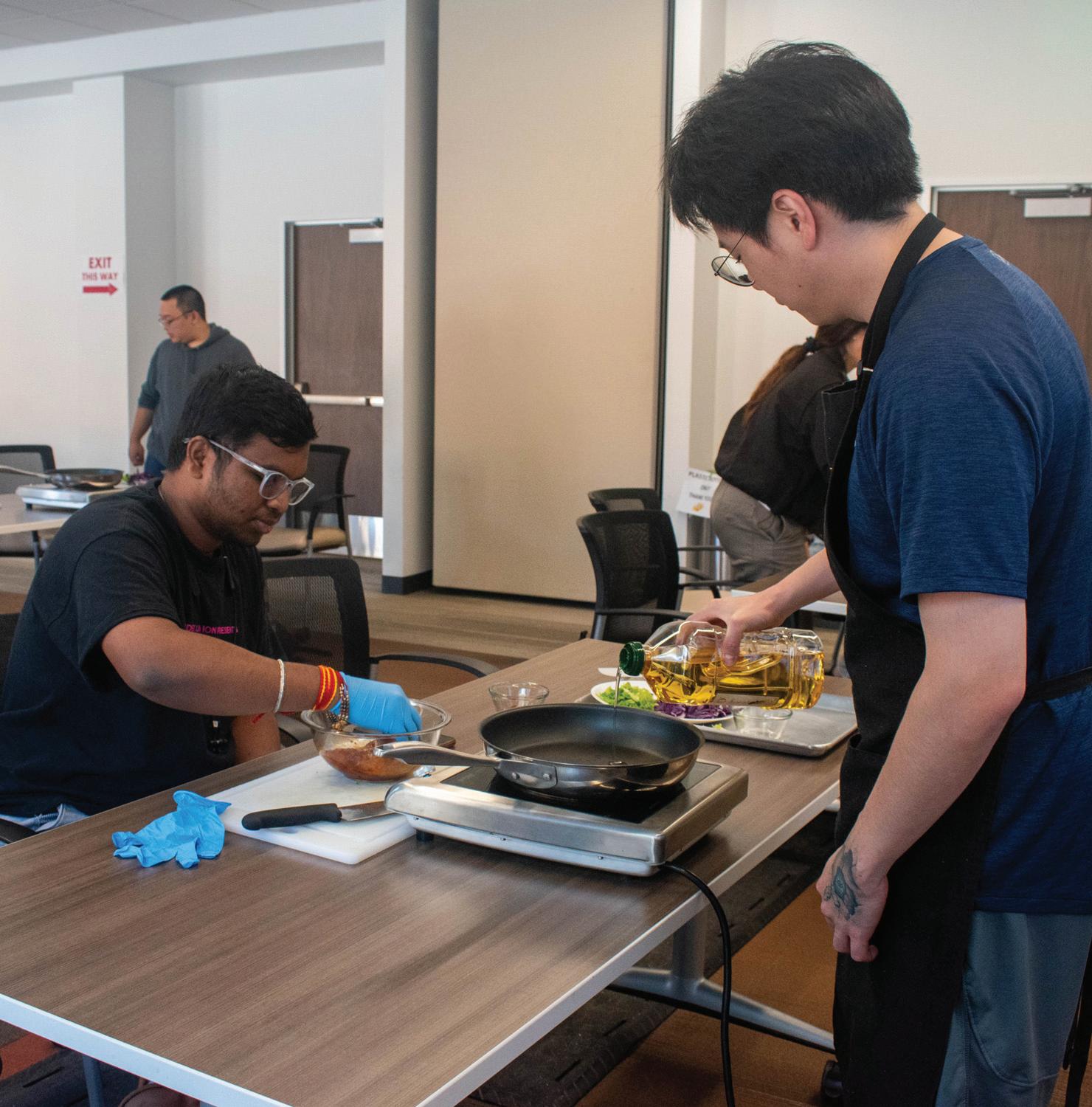
CHEW opened registration for its cooking demonstrations earlier this month and received many RSVP’s. This system gives CHEW time to plan and gather the necessary items for the demos that take place the last two weeks of every month.

“We try to make sure that each recipe is a bit different than the other so we are not going to have the same recipe in one week,” Bumanglag said.
“You’re gonna have a variety of recipes within the week.”
In case students missed the RSVP deadline, the program welcomes walk-ins on the day
of the event. Management information systems junior Christian Guzon was invited to the event by Nick Yang, nutritional science student and assistant cook for CHEW.
“I was just walking to go get some food at the Student Union and then I saw signs outside and Nick told me to come inside for food and I was like, ‘Okay, let's do it,’ ” Guzon said.
As the cooking demonstration began, students paid close attention, asking questions when they needed help and laughing at their cooking mistakes along the way.
“Sometimes they’re really invested to the point where it's like, ‘Okay, I’m just gonna have a whiteboard’ so we try to go ahead and have that
education for them to read out, just in case they didn’t catch it,” Bumanglag said.
Along with learning recipes, students also had the opportunity to socialize with one another as they shared ingredients and cooking utensils.
“I really enjoy and appreciate all these events that bring people together from different majors,” said English senior Alice Nguyen. “That's one thing, once you get into your major you meet people. So it's nice to meet other people who are not English majors.”
Nataly Aceves, the campus dietitian at the Student Wellness Center and overseer of the CHEW program, emphasized the overall goal of the program. She said she believes that the connection
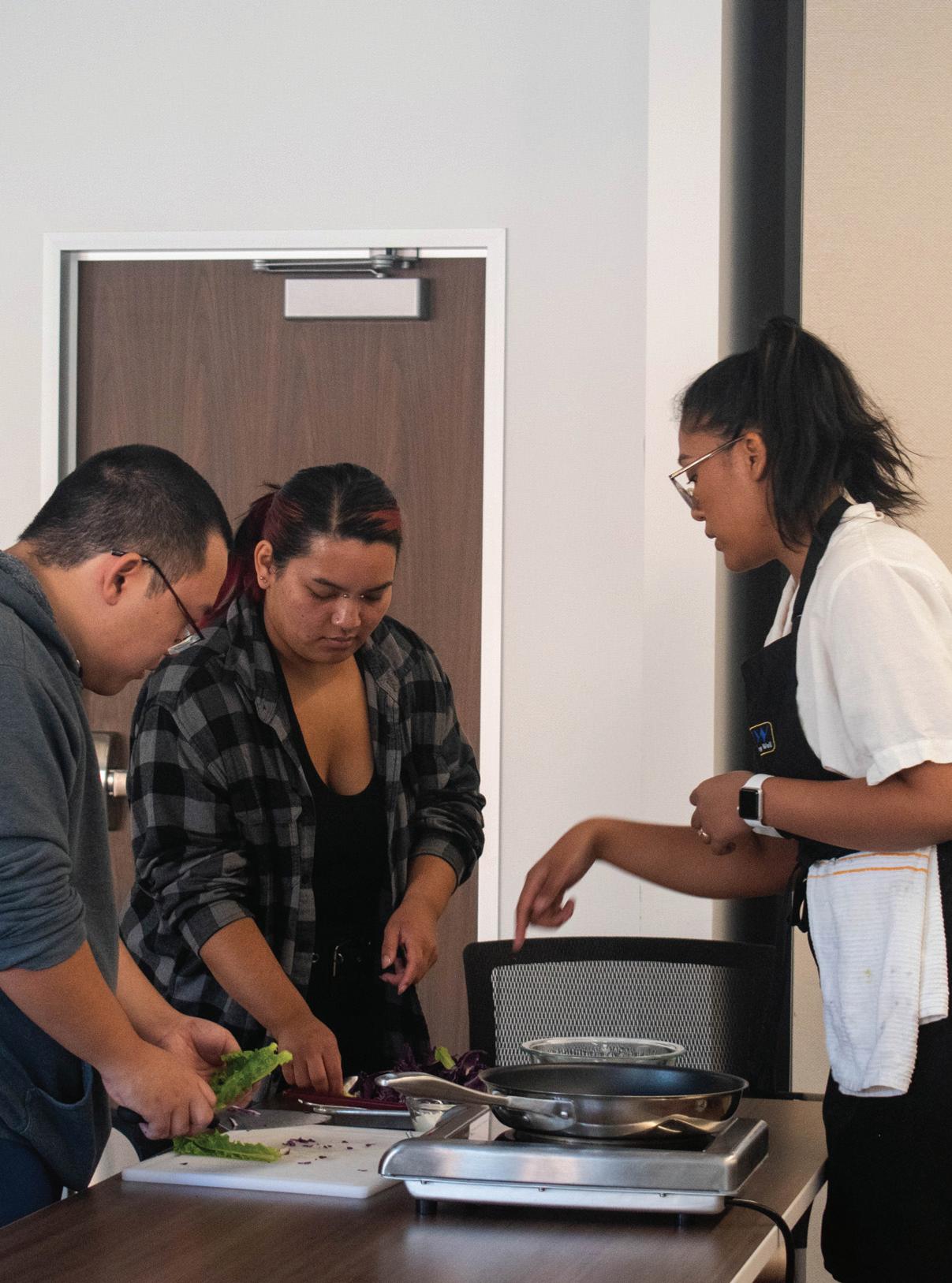
between people and food will lead to a healthier and more fulfilling life for students.
“Having that space to connect with one another through cooking because food brings everyone together, right?” Aveces said. “And you know, as long as one of those things happens, we're very happy.”
sjsunews.com/spartan_daily WEDNESDAY, SEPTEMBER 27, 2023 ARTS & ENTERTAINMENT 4
1. Student cook Staceylline Bumanglag leads a cooking demonstration for the the CHEW program.
2. Assistant student cook Nick Yang (right) pours oil into pan for a CHEW attendee.
3. Student cook Staceylline Bumanglag offers knife techniques
during the cooking demonstration.
4. Attendees practice their newly learned grilling techniques at the CHEW event.
PHOTOS BY JOANNA CHAVEZ
Follow the Spartan Daily on X (formerly Twitter) @SpartanDaily 3 4 2 1
Accepting my Vietnamese identity
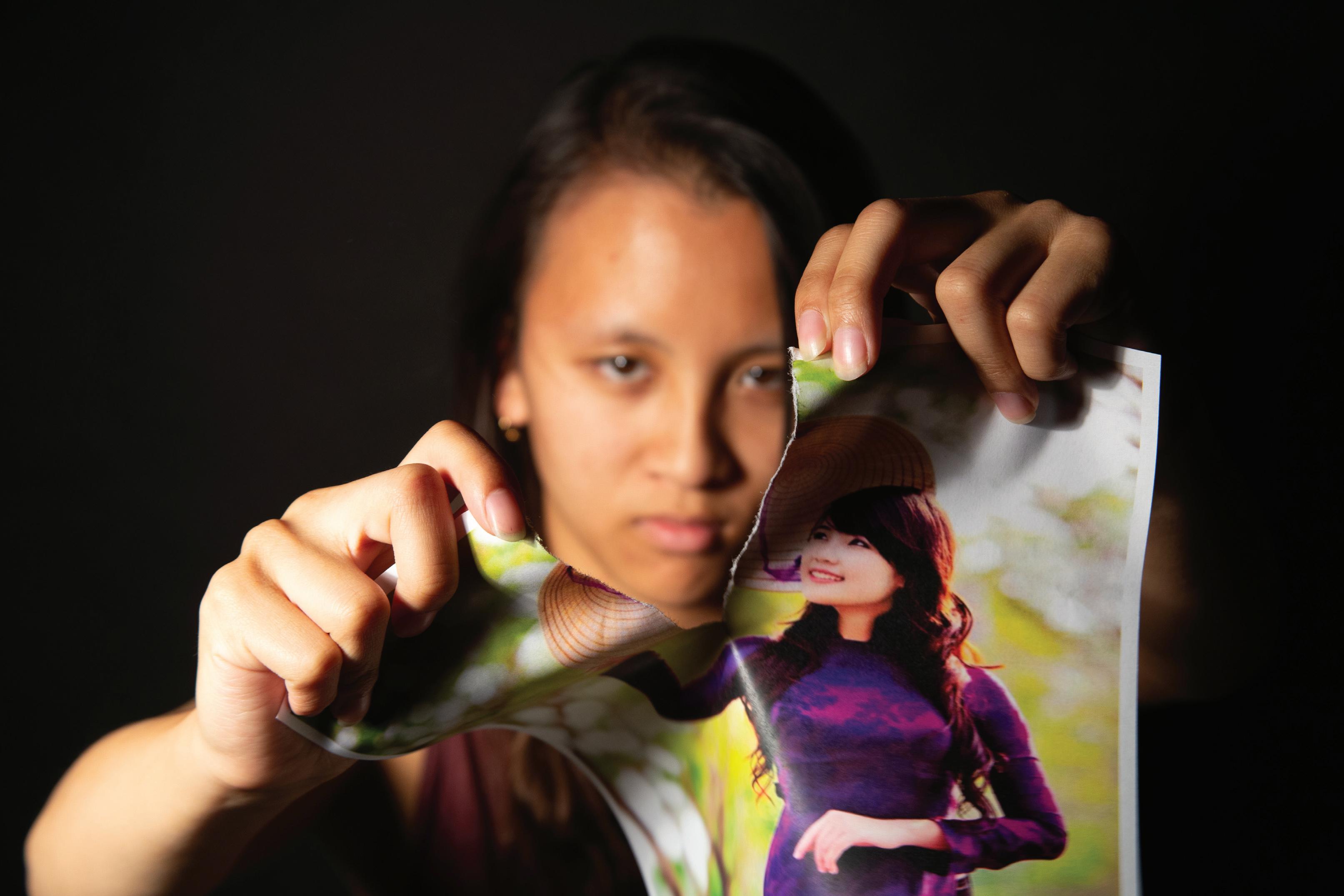
be a bad idea to cut my hair into a pixie cut because it would make my face too round and I wouldn’t look feminine enough.
Alina Ta ASSISTANT NEWS EDITOR
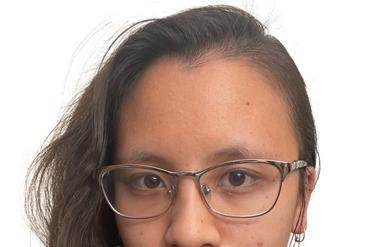
My experience growing up as a Vietnamese American could be compared to watching a tropical bird have its beautiful tail feathers slowly ripped from its body.
My family, unknowingly, and society, intentionally, taught me to not embrace my tail feathers in hopes that I would blend in with the everyday American pigeon.
The process of forced assimilation started with not being able to speak my native language and not having enough access to portions of my community’s history.
It worked, almost disturbingly well. The body and mind of this little bird still ruminates on what it means to be Vietnamese American.
However, this subtle influence to fully assimilate for the comfort of others failed to give me a sense of belonging. Instead, it forced me to feel isolated from both the Vietnamese American community and American society.
I, a tan tomboyish woman who can’t even perceive having a romantic relationship with a man, will never be pale enough or feminine enough to look as “Vietnamese” as the models I see in my family’s New Year calendar.
I’m disappointed when I reflect on memories of my younger cousin and I, comparing each other's skin tones to see who was paler.

I’m sad that I remember my mother telling me that it would
I miss being able to have a strong pace and energy in my walk, before my father taught me how to walk properly.
My father taught me to walk in a straight line on the painted edges of sidewalks because he was embarrassed when one of my uncles described my way of walking looked more like a masculine march.
And it always scares me to remember that when I came out to my mom as bisexual the first thing she told me was, “Well, at least you are still into men.”
I had to explain to my mom weeks later that I only have romantic
Without knowing my native language, I end up standing idly by as I watch my parents make sounds of random words that have no meaning to me. I saw the language as a way to help the adults keep secrets and gossip without their children knowing what was being said, but it made sitting at family dinners lonely and pointless.
Yes, it’s my responsibility to learn my native tongue. Just please give me a few years to get my college education out of the way so I can earn the money to pay for Vietnamese classes.
The shame I carry and the alienation from my own community makes learning a new language as daunting as learning calculus.
I promise you I am ashamed and feel quite
never felt its communal presence from the Vietnamese American community.
I’ve prayed in front of our altar at home, with the light above the statue of Lady Buddha shining over me.
My mom taught me how to pray multiple times throughout my childhood, but I don't know what the prayer means because I don’t remember the English translation.
My mom has tried to teach me about our religion so many times, but I always end up being more confused.
I was a teenager standing next to the kitchen table when my mom explained what our religious text was. Her overall response was that if you pray to this book, Buddha will respond to
frustration and decided that dying wouldn’t help him reach enlightenment. He experienced enlightenment when he stopped meditating because he finally gave up his last temptation that was giving him a sense of greed and suffering, the desire to be enlightened, according to the same source.
The moral of the story is that Buddha overcame temptation and his desire for all human desire.
However, I don’t see pleasure as something you need to avoid. I see pain as a lesson on how to endure the bitter parts of life and a lesson on how to be more grateful for the sweeter moments.
Not being able to speak my native language is devastating, but I appreciate the moments where I am still
seen as exotic and foreign by the media and in the classroom.
It made it harder for me to blend in with my kind, the other birds with colorful tail feathers.
I’m still not the everyday blonde and blue-eyed pigeon with pale white skin.
This is because people around me, both non-Asian and Asian Americans, appear to have forgotten the body and the soul of this bird has not changed.
My blood, my features and my experience living in this world is still Vietnamese, but my perspective from growing up in an immigrant family makes me more American than most would realize.
My parents traveled thousands of miles through the Pacific Ocean to come to America as Vietnamese refugees.
attraction to women and I could never see men beyond either being friends or human dildos.
The amount of times someone has asked me if I can speak Vietnamese makes my blood boil.
My lack of ability to speak my parent’s native tongue is what made me question if I would be excluded from or bullied by my high school’s Vietnamese American club.
My inability to be bilingual is what makes me wonder if I can compete on the same level against a white job applicant because no one expects the white new kid to fit into the mold of the diversity hire.
guilty. Nothing hurts more than realizing I’ve never had a full conversation with my grandma because she can’t speak English, just like I can’t speak Vietnamese.
Yes it’s true, I’ve never been able to tell my grandma, “I love you” without a third party translator.
The one piece of my identity that should still connect me back to my community is that I am Buddhist, but I have no idea what it means to be Buddhist in the first place.
I am aware that Buddhism is one of the most common religions in Vietnam, but I’ve
your wishes, leading me to ask, “So it’s like a spell book?”
My grandma laughed after my mom angrily translated to my grandma what I had just said.
The only thing helping me hold on to my belief in Buddhism is the story of Buddha’s enlightenment.
Ironically, I learned this story in my World History class in high school.
The story is about Buddha who starved himself nearly to death under a Bodhi tree in an attempt to find enlightenment, according to a BBC webpage.
On the last day of his fast, Buddha gave up in
able to bond with my grandmother.
We just spent a small moment looking over old photos from her day, using the few tiny words we can understand and speak, while heavily depending on each other’s gestures to communicate.
The pain of trying to understand how to merge both my Vietnamese and American identities together is daunting, but my gratitude for the experience putting me through a life-long journey of understanding myself outside of societal labels is priceless.
Assimilating into American culture failed to protect me from being
My mom and my dad along with thousands of other Vietnamese immigrants, migrated on boats from Asia to America after the Vietnam War, creating a parallel between me and the descendants of those who came to the shores of the East Coast on the Mayflower in Sept. 16, 1620.
However, whether or not you can accept it, I am both Asian and American. One cannot exist without the other unless you don’t want me to exist at all. No, I will not crawl back into the womb, just because your mind isn’t flexible enough to process nuance.
sjsunews.com/spartan_daily WEDNESDAY, SEPTEMBER 27, 2023 OPINION 5
DIRECTED BY ALINA TA, PHOTO COURTESY OF HOLLY HANCOCK
Follow the Spartan Daily on X (formerly Twitter) @SpartanDaily
However, whether or not you can accept it, I am both Asian and American. One cannot exist without the other unless you don’t want me to exist at all.
Relegation: The future of college football
12 division and the second tier playing in the Mountain West division. The plan included adding both North Dakota State and South Dakota State to have 16 football-playing teams.
Even as Cal and Stanford announced the intention to leave the PAC-12 in 2024, the saga around conference realignment continues as Oregon State and Washington State have yet to find a conference to go to next season.
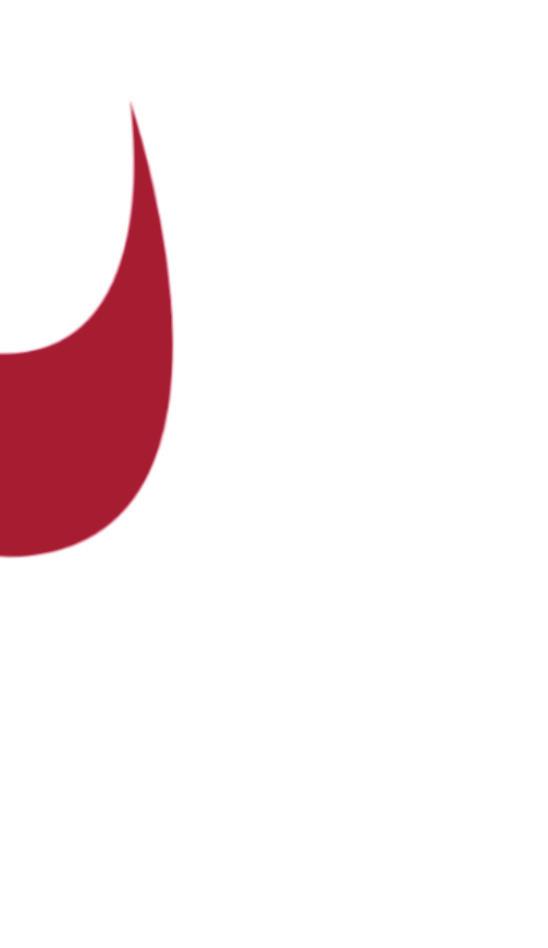

A new solution for the two schools and the existence of the PAC-12 has come to light. According to a Sept. 19 Yahoo Sports article, PAC-12 and Mountain West officials have kicked around the idea of merging the Mountain West and PAC-12 with a system that involves a relegation and promotion for teams competing in the conference.



Relegation is a popular system used most notably by European soccer leagues, such as the English Premier League. In a relegation system, teams who finish last in the top league are brought down to a lower division while teams who finish first in a lower league are promoted to the league above them.
The new conference would work in basically two divisions with the first tier of teams playing in the PAC-
The winner of the PAC12 division would get an automatic bid for the expanded college football playoff. The 8th place finisher of the PAC-12 would get relegated to the Mountain West, while the sixth and seventh place finishers would play against the first and second place winners of the Mountain West to play for a spot in the PAC-12 division.

In theory, the new format does a lot of good for both conferences, but there are some downsides that could prevent the plan from happening.
Why is relegation a good idea?
If there’s one thing all college athletic departments can agree on, it’s that cash is king.
A relegation system would certainly make things interesting and make more fans tune into games that they wouldn’t normally watch. More eyeballs on screens equals more money in the school’s pockets.
Imagine an end-ofthe-season slate of games that features the PAC-12 Championship to decide who goes to the College

Football Playoff, along with two games to decide which teams get to play another season against elite competition and which get relegated to the lowly Mountain West. The ratings on those games surely would be better than whatever the PAC-12 Network brings in.
Another positive to a relegation system is that the PAC-12 survives. As bad as the leadership is for the PAC-12, the conference has done a good job maintaining a business structure that can rake in $20 to $30 million a year, split between the teams in the conference.
Mountain West teams could benefit greatly from the established relationships that the PAC-12 has with ESPN and FOX. According to a July 21 Yahoo Sports article, Mountain West schools currently make anywhere from $3.25 to $4 million dollars a year from the current media deal.
From a storytelling standpoint, relegation could make for some of the best storylines in college sports. The thought of Oregon State, a long-time staple program on the West Coast, losing to a team like North Dakota State is bonkers.
The media coverage for a Cinderella story would make the league even more interesting.
The fear of relegation and the payoff of promotion makes teams actually care about their football
programs. The sense of urgency for coaches and athletic directors would be at an all-time high. No one wants to be the team that got relegated to the lower division, meaning the pressure for coaches to succeed becomes even greater.
Why relegation is a bad idea?
The big problem with relegation in Europe is that once a team is relegated, it's very hard for said team to gain back relevance even when it gets back to the top of the league.
I can point to soccer teams like Sunderland A.F.C who have been stuck in the Champions League (secondary English soccer league) since 2016. Sunderland was considered at one time one of the more iconic English Premier League teams, winning six titles and a runner-up five other times. But after getting relegated, the team has failed to reach the Premier League and has lost money and players to bigger clubs.
The same could happen if the Mountain West and PAC-12 resort to the same relegation system. A team like the University of New Mexico can easily lose relevance with a couple of bad seasons in the second tier division.

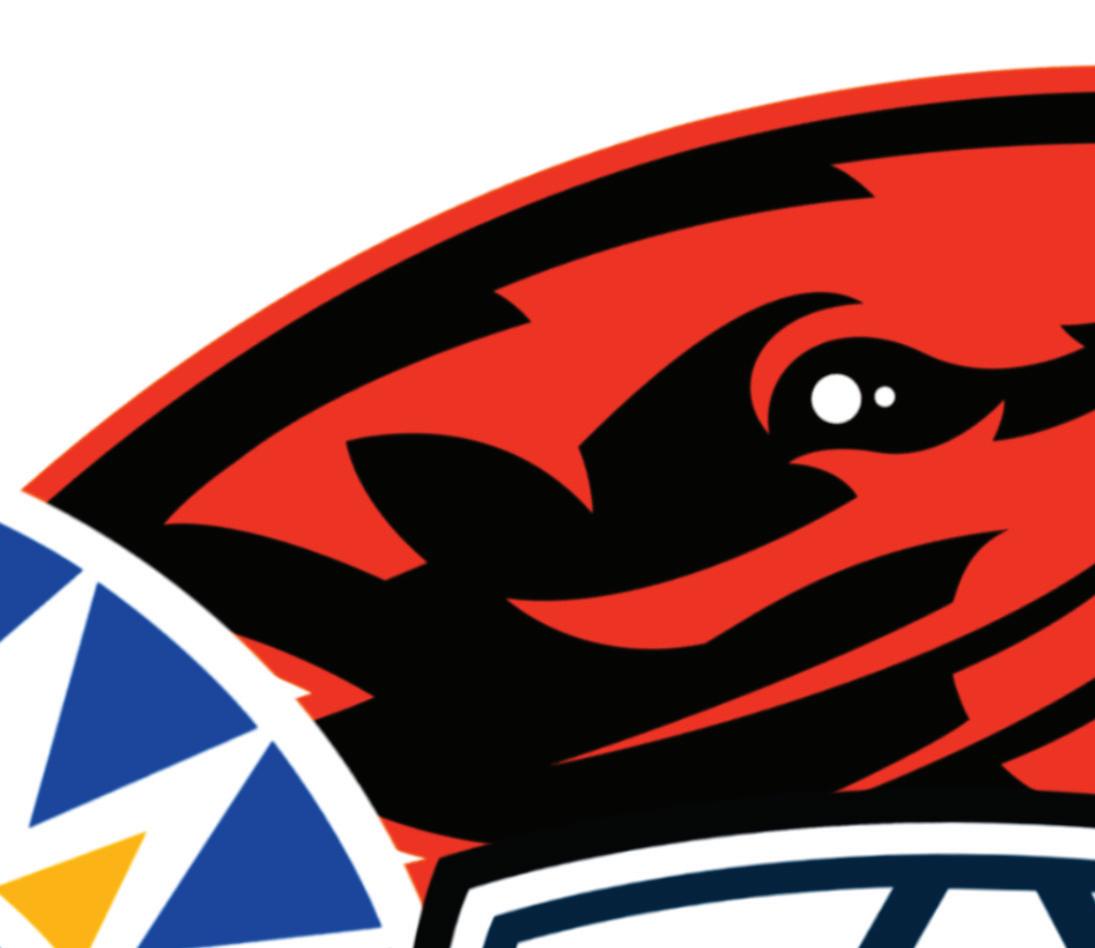
Teams who continually lose could be bad for a very
long time. It could be much harder than it already is to get recruits to come to bottom-feeder type schools who don’t have a tradition of winning.
One of the reasons why the American model of sports business is so appealing is because of the chance for teams to get better after a few bad seasons.
The current state of college football makes it so that it only takes one or two great seasons to get a program back on a winning track. There might be a few seasons of low points, but making a few Bowl games gets a losing team back to winning ways.
Relegation could make college rebuilds much longer and much more painful.
What happens to San José State in a relegation system?

I can see the Spartans both benefiting and getting hurt in a system like this.
For starters, the league would have to decide what teams start in what division in the first year of a relegation system, and honestly, SJSU’s chances of joining the PAC-12 division are slim.
Oregon State, Washington State, Boise State, Fresno State, San Diego State, Air Force and Nevada are almost guaranteed to be in the PAC12 division based on brand
power and recent success. The eighth spot could go to SJSU, but I’d argue UNLV, Colorado State and North Dakota State have a better history of winning or are in a prime location that is marketable to TV networks.
The benefit of SJSU being in a relegation league is that the school would make five times more money than it makes now. According to an Aug. 28 Athletic article, San José State’s athletic department breaks even on its profits from school sports.
More money means more resources for the athletic department to spend on getting players to come to San José.
And if the Spartans win, they could potentially climb out of the shadow of Cal and Stanford. A Cinderella run that leads to SJSU getting into the College Football Playoff is a huge story even if the Spartans lose to a bigger school like Alabama or USC.
So far, the relegation idea is just one idea to save the PAC-12 with nothing set in stone, but the fact that the idea is getting discussed is interesting. If the plan does indeed go through, the PAC-12 and Mountain West could change the landscape of college sports forever.

Follow Nathan Canilao on X (formerly Twitter) @nathancanilao

sjsunews.com/spartan_daily WEDNESDAY, SEPTEMBER 27, 2023 SPORTS 6
CANILAO'S COMMENTARY
ILLUSTRATION BY TRACY ESCOBEDO
Nathan Canilao SENIOR STAFF WRITER
EDITORIAL STAFF EXECUTIVE EDITOR MATTHEW GONZALEZ MANAGING EDITOR JILLIAN DARNELL PRODUCTION EDITOR ALICIA ALVAREZ NEWS EDITOR IRENE ADELINE MILANEZ ASSISTANT NEWS EDITOR ALINA TA A&E EDITOR ALEXIA FREDERICKSON SPORTS EDITOR MAT BEJARANO CONTACT US EDITORIAL –MAIN TELEPHONE: (408) 924-3821 EMAIL: spartandaily@gmail.com ADVERTISING –TELEPHONE: 408-924-3240 ADVERTISING STAFF ADVERTISING DIRECTOR MIA WICKS ABOUT The Spartan Daily prides itself on being the San Jose State community’s top news source. New issues are published every Tuesday, Wednesday and Thursday throughout the academic year and online content updated daily. The Spartan Daily is written and published by San Jose State students as an expression of their First Amendment rights. Reader feedback may be submitted as letters to the editor or online comments. SOCIAL MEDIA EDITOR BOJANA CVIJIC OUTREACH EDITOR CHRISTINE TRAN PHOTO EDITOR ALEXIA FREDERICKSON COPY EDITOR GILLIAN BROWN SENIOR STAFF WRITERS BRANDON NICOLAS NATHAN CANILAO STAFF WRITERS DYLAN NEWMAN NAVIN KRISHNAN NIKITA BANKAR MELANY GUTIERREZ JULIA CHIE ANGEL SANTIAGO VANESSA REAL AALIYAH ROMAN FERNANDO CARMONA JACOB CHAVEZ MAYA BENMOKHTAR LAMAR MOODY ILLUSTRATORS JOANNA CHAVEZ TRACY ESCOBEDO PRODUCTION CHIEF MIKE CORPOS NEWS ADVISER RICHARD CRAIG EMAIL: spartandailyadvertising@gmail.com CORRECTIONS POLICY The Spartan Daily corrects all significant errors that are brought to our attention. If you suspect we have made such an error, please send an email to spartandaily@gmail.com. EDITORIAL POLICY Columns are the opinion of individual writers and not that of the Spartan Daily. Editorials reflect the majority opinion of the Editorial Board, which is made up of student editors.
 By Nikita Bankar STAFF WRITER
By Nikita Bankar STAFF WRITER





 By Julia Chie STAFF WRITER
By Julia Chie STAFF WRITER



















